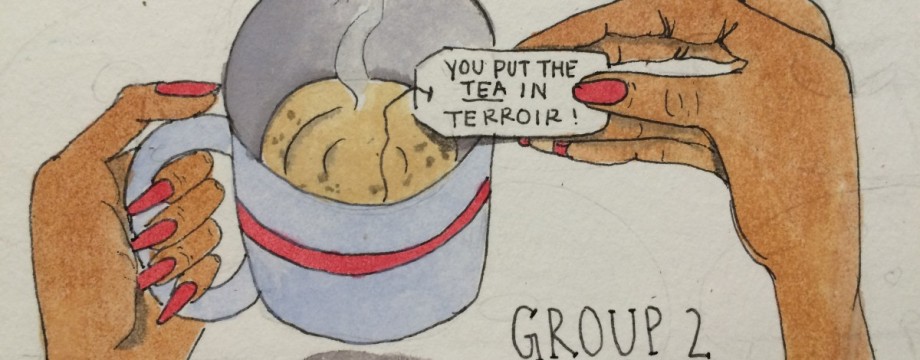Component by Tai Jordan / photo by Willow-Creek Feighery
Passed, let go, no longer with us, in a better place, all phrases used to soften an otherwise seemingly devastating blow– the reality of the truth. The truth is not something anyone in the nation of America is taught to believe in as constructive part of living and more importantly thought of being something that alone isn’t enough it needs to be embellished in order to be captivating enough for someone to listen. It’s true no one can handle the truth we are taught to run from it so we do. At some point some also think what’s that point of the truth if still many line up to buy various goods, specifically tea knowing what they know. To some extent ignorance is bliss for some this works out because one can’t actively engage in oppression if they can still claim they “didn’t know what they were doing”, but what is the excuse if you do know? What happens now? Reading The Darjeeling Distinction by Sarah Besky really forced me to think about the injustices the systems of the colonial era instilled and how in post-colonial times they have continued to structure modern day practices– or do they?
Originally the workers on these plantations were given something that was deemed as “fair” in terms of compensation– house improvements, land, food, money etc. However, as Tea became more centralized in mass production and not the quality of the production it has become vastly different from its original system; in terms of the follow through required of the plantation management team. Fairness and Justness are now ideas painted for the enjoyment of the consumer a way to pat one’s self on the back and say I did my good deed for the day I do not actively involve myself in worldly injustice.
Fair trade does not exist for the betterment of the worker’s family, condition or status. Laborers called farmers, plantations often referred to as gardens, smiling faces of women plastered to billboards romanticizing, glamorizing, and distancing the consumer further from the colossal problem that is fair trade. The saddening part is that after listening to a talk by Yoshiko Harden I came to realize their system is perfect. The reason I say this because there is no such thing as a flawed system. If we stop to think for a moment who the system was designed by, who it was supposed to benefit, and who currently keeps the system intact, it’s all the same people who put it in place to being with- Businessmen.
It has always been a business. Someone figured out that Tea was a goldmine and didn’t have to work very hard to disenfranchise a people because there were no labor restrictions already in place. They knew people needed work so why not create jobs in exchange for a specific unexplained compensation of some sort. Only later post-colonial era did someone say this is unjust. The institution of fair trade was implemented for a number of reasons one of them being as a means of minimizing the financial gap between laborers, plant. Managers, and the market. Now doing more hurt than good it is the blanket regulations that exploitation operates under legally!
Terroir is being abused and misused as a marketing ploy. Reaching the consumer on the level that taste of place is only as genuine as the place it comes from plays to this idea of authenticity; increasing the market value automatically. Someone will pay more for tea “made in India” than they would for tea “made in California.”
At the end of it all I walked away with a vast sense of knowing, but now the question I am tasked with challenging is my integrity as a human of the earth and my fluid place in it. How I operate now is completely different just by asking the question is knowledge the key that enables me to go farther or does it dismantle the very people it sought to educate, is that ignorance ultimately bliss? Still processing.
The world doesn’t need us to heal. When we have all vanished into to the distance and are the present history, the earth will heal. How do we choose to inhabit it in our short time here, and at whose expense it’s time to step up or be stepped on the roots we come from the depths of the sea to the tallest mountain deserve more, we can do more, we can be more, we are more!



